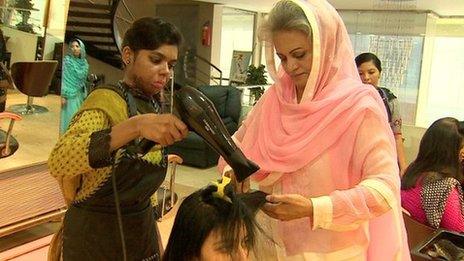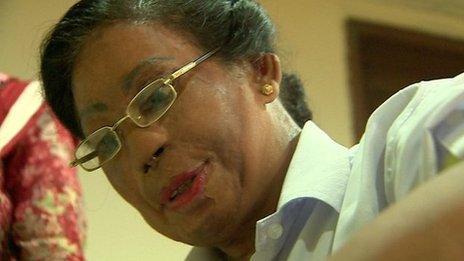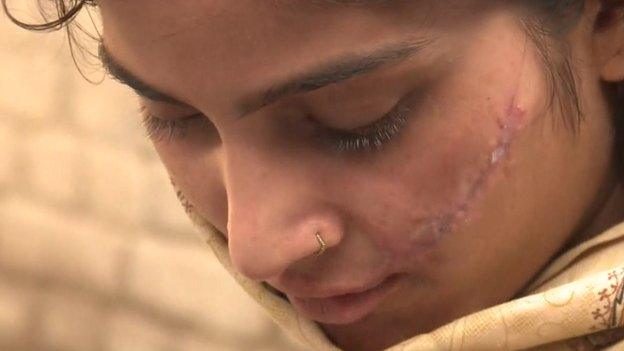100 Women: The salon helping acid attack victims
- Published
Beautician Bushra Shafi is offering victims of acid attacks a refuge
Beauticians are hard at work in a high-end salon in an affluent area of Lahore in Pakistan. The sound of women's chatter and laughter is mixed with the continuous roars of hairdryers.
It is hardly a place you would associate with acid attack victims. But for more than a decade Musarat Misbah's salon has been a refuge for women who've been attacked by acid.
It started when a woman came to Musarat's salon with her face covered.
"When she removed her veil, I had to sit down. There was no life in my legs," Musarat said.
"In front of me was a woman with no face. Her eyes and nose were gone and her neck and face were stuck together so she couldn't move them."
The woman hoped that Musarat, a veteran of the beauty business, would help her look better.
Eyes burned shut
Musarat called doctors and asked them to help the woman - and thus began her charity work for acid attack victims.
In the last 10 years, Musarat has helped hundreds of acid attack victims. With donations, she pays for their medical treatment and then trains them for the workplace. Some now work at her salon.

For more than a decade Musarat Misbah's beauty salon has been a refuge for women attacked by acid
Bushra Shafi is one of the most experienced beauticians. She is also an acid attack survivor.
Bushra was attacked by her in-laws as punishment for not paying enough dowry money.
"My husband, brother-in-law and father-in-law poured acid on me - my mother-in-law tied me down from the neck. They didn't take me to the hospital for 10 days and my face swelled so much it was just a big slab of meat," Bushra said.
Bushra went to Musarat for help. Her eyes were burned shut, her nose was gone and parts of her ears had melted.
She spent years undergoing operations and now, after 150 of them, she has a chance to start a new life.
"I'm grateful," she says. "I've got my eyesight back, my hearing back, I have a nose I can breathe from, a tongue, I can speak again."
The scars on her face cannot hide her smile as she speaks.
Acid attack survivor Huma Shahid explains the physical and emotional pain of being targeted 10 days before her wedding
Musarat's charity is one of very few organisations in Pakistan that have taken on this cause. She says the government needs to do much more to help these women.
"Because it is a female-orientated issue, it comes right at the bottom of their [the government's] priority list. Also, they say it tarnishes the image of our country. This is why it is hushed up and swept under the carpet."
'Days before my wedding'
There have been at least 160 acid attacks recorded this year alone but charities say the real number is likely to be much higher.
Many victims keep quiet because they are afraid they will be attacked again.
And even when some cases are reported and make it to court, the perpetrators rarely face justice.
"Because of the social stigma to this there's so much pressure on the victims and their families," Saad Rasool, a lawyer working on a new law to criminalise acid attacks, says.
"Many families settle outside court and no one gets convicted," he adds.
Huma Shahid was attacked in January. She was a lecturer and on her way back from university. Someone threw acid on her just outside her house and escaped on a motorbike.
"It was 10 days before my wedding," she said.
"I was about to marry the man who adored me, but all of a sudden my life changed."
Huma spent months in hospital and says she still needs more operations.
Her face is still covered with a protective mask, which she hides with a headscarf.
She says the man who poured acid on her is still at large.
Huma says she hasn't been able to look at her face in the mirror since the attack.
"It is so painful - whenever I reflect - I'm overwhelmed by the sheer brutality of the crime. People call me a strong woman. But I'm not that strong to see myself like this," she said.

Some acid attack victims Musarat has helped now work at her salon
Huma adds she never expected this would happen to her. She thought acid attacks were a problem for people from poorer areas who were less well-educated.
"I think it's not about being educated or not. It's a mindset. People believe that these attacks on women are somehow justified. You notice that the majority of cases are women. They are considered a weaker gender," she said.
Huma has taken her case to court. She says that despite everything, she wants to get on with her life and her work - but it is not always easy.
"It's very frustrating at times to realise that the person who actually did this to me has not been caught yet. Sometimes I feel helpless."
Despite the fact she still faces a number of operations Huma says she hopes one day she'll be able to look in the mirror again.
The BBC's 100 Women season runs online, on BBC World News TV and on BBC World Service radio from 27-29 October. Join the conversation on Facebook and Twitter, using the hashtag #100Women., external
- Published16 July 2014
